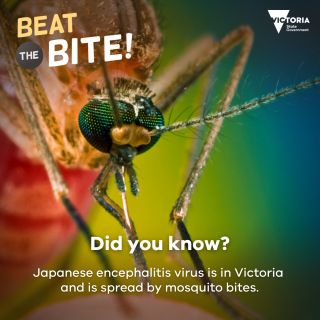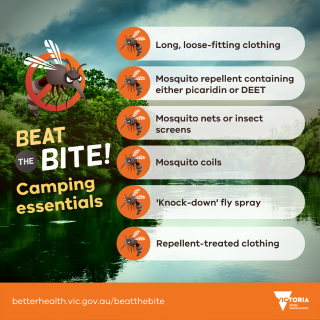Japanese Encephalitis Virus
Japanese encephalitis virus (JE virus) has been detected in Victoria for the first time. JE virus is a rare but potentially serious infection of the brain caused by a virus spread to humans through mosquito bites.
The virus is mostly spread to humans from pigs via mosquito bites and cannot be spread from human to human. It also cannot be spread by eating pork.
A comprehensive response across human and animal health sectors is underway in Victoria and to implement control measures. Examples of this response include; vaccinating those at risk, surveillance of animals for JE virus, public health information, and mosquito testing and control activities.
The Department of Health has developed this social media pack to support other departments and key stakeholder groups to promote important prevention messages to protect the community.
Japanese encephalitis


- Japanese encephalitis virus is a rare but potentially serious infection of the brain caused by a virus spread through mosquito bites.
- While 99% of cases will have no symptoms, those that do develop symptoms may experience a fever and headache, or more serious symptoms like nausea, vomiting or seizures.
- Japanese encephalitis has been detected for the first time in Victoria, with main areas of concern being along the Murray and in northern Victoria.
- While it is important to be aware of the presence of JE virus in specific geographic areas, the risk of contracting JE and developing serious illness still remains low. However, anyone being bitten by mosquitoes in these areas is potentially at risk
- Children aged under 5 years old and older people who are infected with JE virus are at a higher risk of developing more severe illness, such as encephalitis.
- For more information see your GP or phone NURSE-ON-CALL on 1300 606 024, or go to https://www.betterhealth.vic.gov.au/japanese-encephalitis
Mosquito bite prevention
- Victorians are being reminded to protect themselves from mosquito bites particularly when we are spending time outdoors.
- If you’re spending time in northern Victoria or the Murray region, or spending time outdoors – don’t forget to pack mosquito repellent that contains DEET or picaridin.
- There are simple steps to avoid mozzie bites and protect themselves and their family against mosquito-borne diseases.
- People should wear long, loose fitting clothes and use mosquito repellent containing picaridin or DEET on all exposed skin.
- Ensure that insect screens fitted to doors and windows around the home or in caravans are in good condition, or insect flaps on tents are intact and closed.
- Heavy rainfall, floods, high tides and warm weather increase mosquito numbers.
- Reduce mosquito breeding sites by getting rid of stagnant water around the home or campsites.
For more information relating to protecting against mosquito bites see Beat the Bite on the Better Health Channel at https://www.betterhealth.vic.gov.au/campaigns/beat-the-bite




